QuestionI sent this question to another expert on the 20th, but have yet to receive a response, and now condition is changing for the worst (or at least that is my opinion). We need help now!
My 4 yr old Blood Parrot cichlid was swimming upside down for over a week in her main tank. She had a habit of swimming sideways and hiding in her cave upside down, but I would feed her peas, and she would be back to normal. I try to feed all my fish a variety of fresh foods as well as dry flakes. Yet I am more aware of the swim bladder problem with blood parrot cichlids, so they tend to get a lot more fresh/defrosted foods than my others (peas, canteloupe, mango, live red wigglers, defrosted krill/bloodworms, spinach, and plankton).
I separated her into a hospital tank (9 gal) and treated her tetracycline (1 cap per 10 gal per directions, reserving the leftover gal for top off/cleaning water) and with Jungle Fungus Eliminator (bottle says it clears fungus and bacteria) per bottle instructions for 4 days before performing a 75% water change (per directions) with new treated/medicated water (both tetracycline and Fungus Eliminator). I did the medication route just in case there was an underlying infection or parasite condition causing her problem to be so severe.
Initially, she would swim to eat the peas, JUNGLE Anti-Parasite medication pellets (which were soaked prior to feeding her) and tried very hard to catch the red wiggler worm (but was unsuccessful) I gave her last Wednesday (8/18).
After the first week, I decided to try to fast her for a few days to see if she would finally eliminate whatever was causing her to be upside down. Still no change.
Her water temp is at 80 degrees, and thankfully the tank she was in (a JEBO) has a built in filter which cascades into the middle of the tank (not using any carbon, just floss) that she has been positioning herself under, because her bottom side and fins would otherwise be exposed to air.
She was still a vibrant pinkish orange until today (getting paler and underside is now soft to the touch, anal tube is reddish and seems irritated) and she wants to eat, but is having a very difficult time getting to her food. And I am afraid that she is gulping air when she is attempting to eat, which is making her situation remain the same. i have tried to put food directly in front of her, but she seems spooked and afraid to eat when I do this. I am almost at the point of feeding her smashed peas through whatever type of plastic syringe I can locate (I think I have one someplace that we have used to dose small 3gal hospital tank. If I can locate it, I can sterilize it to force feed her.)
I am at a loss at what else to do. She had been treated in the hospital tank for 9 days, with no change in buoyancy. She seems to be becoming weaker, as now she is not able to get to the bottom of the tank to get food that I try to feed her.
My boyfriend and I decided that if she was dying that she should be with her old tank mates, rather than secluded and alone. So we put her back into the 100 gal tank, and she seemed more interested in food (which I made sure has been only fresh veggies, fruit, live red wigglers and defrosted brine shrimp/bloodworms/krill since she has returned so she wouldn't eat anything dry). She tried very hard to get the red wigglers tonight, but was unsuccessful again. She did manage to get to the bottom of the tank and may have gotten some of the krill or brine shrimp but I am not sure.
I have heard about doing salt bathes to help them eliminate and hopefully expel whatever air is trapped, but this is always been a recommendation for bettas, and I do not want to do anything more to possibly make matters worse. Should I perform a salt bath? She has positioned herself under one of the filters where the water can flow over her underside, and I have been "swimming" her for a few minutes a day (taking her under the water completely and making her swim, rather than float upside down). Her tankmates do nudge her too, as if to get her to swim. But she ignores them. She can't ignore my hand, though she tries to swim away.
Her tummy swelling seems to have decreased a bit, but now it is not firm, but rather feels soft and mushy. I am very concerned. her tank mates are the same age as she is, and they do not demonstrate any symptoms of swim bladder disease. None of the other fish in the tank have any visible signs of illness or distress (there are 3 other Blood Parrots, 2 angel fish, a common pleco and a red tail shark in her tank. The tank has 3 filters (a 70 gal Whisper hang on, a 60 gal hang on with a bio wheel and a large sponge filter). The tank is well aerated, ammonia, nitrate levels at 0 and nitrites at 40. i do partial water changes of 25% twice a week (as the pleco and the blood parrots tend to be dirty fish) and the tank temp tends to be at 80 degrees. We have hard water, so our ph tends to be around 7.6. I only use Prime water conditioner for removing the chlorine. There are only two live plants (onion plants) because my pleco destroys every other live plant, so this tank has alot of plastic and silk plants, many caves and pvc pipes for hiding, and a piece of driftwood (which has been in the tank for well over a year).
We are very attached to all our fish, but are extremely concerned for Karen at the moment. Do you have any recommendations for her swim bladder problems? And is it possible that she may be egg bound, thus it may not be a swim bladder problem after all?? Grace and Will have been demonstrating mating behavior off and on for the past few months. But Karen has not displayed any that I have witnessed, though she may have when I was not watching.
I really do not want to put her to sleep or worse have her suffer and die. I want to do everything possible to help her with this problem. But if I must relieve her of her continued suffering, I will do whatever is necessary, though it will break my heart. We recently had to put our boxer down after she suffered a massive stroke which left her completely paralyzed and blind, but I did not have to actually perform the task though I was with her during it.
Please let us now if you have any suggestions to help Karen.
AnswerHello,
I am very sorry to hear about your fish.
I am also sorry to tell you I can help you in very limited amounts due to the format of this system.
My advice (since I cannot know, see or do many things I need to do to help you personally) is look for a local vet, specializing or even able to work with fish, depending on how serious you are about it.
One of my friends ad a goldfish (he had had it for 12 years, so it was a very significant pet to him) with exactly the same problem. A basic surgery helped this fish make a full recovery (from a state far worse than your cichlid's) in a matter of days.
I am so sorry I couldn't be more help. Best wishes to you and your fish.

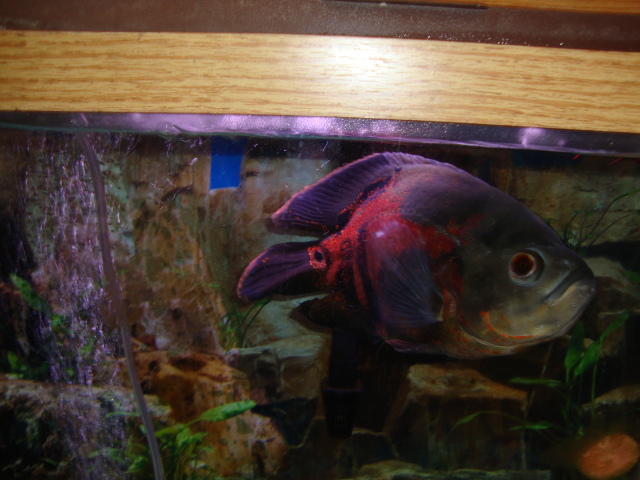 white cotton on Oscar fin
QuestionQUESTION: Hi Ron
Im a long time person of ques
white cotton on Oscar fin
QuestionQUESTION: Hi Ron
Im a long time person of ques
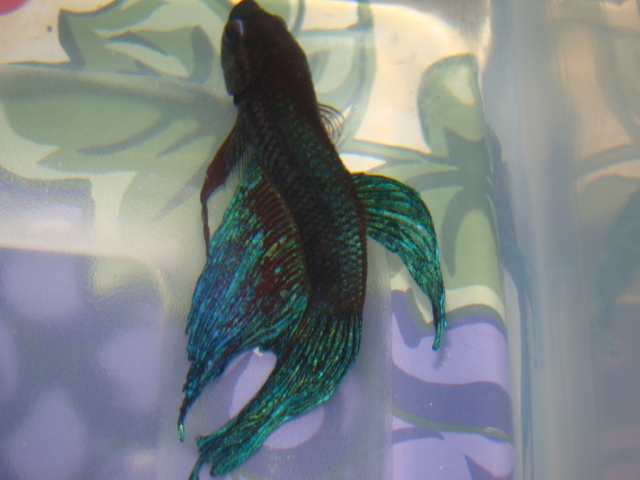 Betta with TB?
QuestionQUESTION: 2 year old male betta sick approx. 2w
Betta with TB?
QuestionQUESTION: 2 year old male betta sick approx. 2w
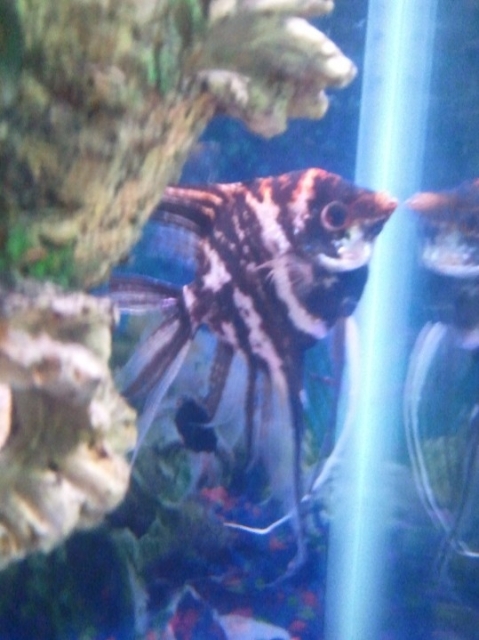 My Sick Angel??
QuestionMy Angel
QUESTION: OK. So I have a 50 ga
My Sick Angel??
QuestionMy Angel
QUESTION: OK. So I have a 50 ga
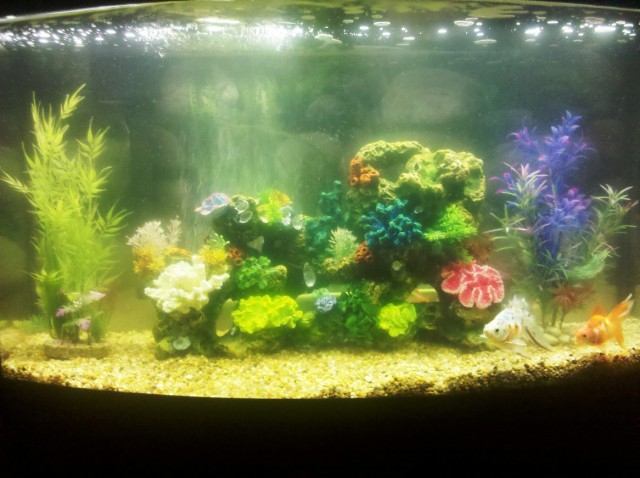 My tank water is green - help!
QuestionMy Tank
QUESTION: Hi,
I have a 46 gallon
My tank water is green - help!
QuestionMy Tank
QUESTION: Hi,
I have a 46 gallon
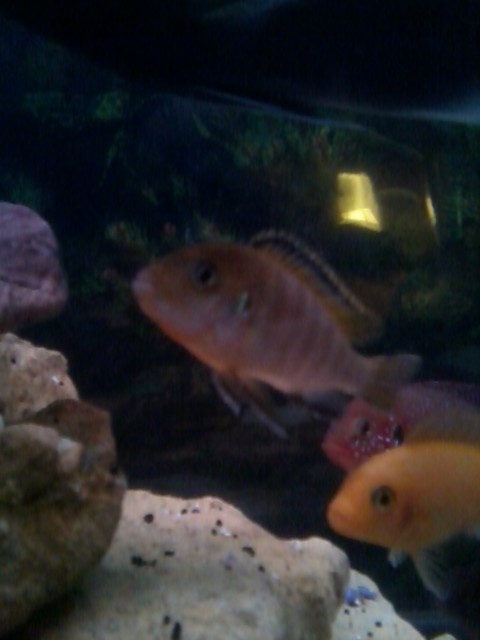 Cichlid compatibility question
QuestionQUESTION: Hi,
I recently purchased a zebra obl
Cichlid compatibility question
QuestionQUESTION: Hi,
I recently purchased a zebra obl